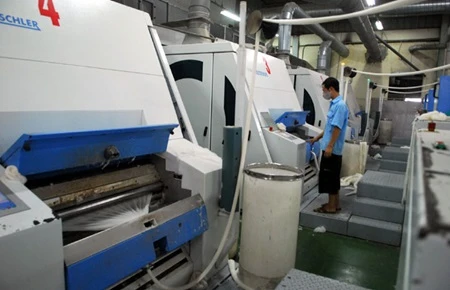 In the first 10 months of the year, the processing and industrial products accounted for 79 per cent of the country's total export turnover. (Photo: casuminaradial.com)
In the first 10 months of the year, the processing and industrial products accounted for 79 per cent of the country's total export turnover. (Photo: casuminaradial.com) Hanoi (VNA) - Industrial products will not have it easy against those from countries with outstanding advantages, as well as cheap imported goods, when Vietnam joins the Free Trade Agreements (FTAs).
"The industrial sector has always been a key pillar in the country's economy with continuous growth increase and a leading position in exported staples," Tran Tuan Anh, Deputy Minister from the Ministry of Industry and Trade (MoIT) said.
However, exports would become sustainable when there is a firm production foundation and a favourable mechanism to support businesses, Anh said.
He told a conference on ‘Sustainable Export Growth of Industrial Products' held in Hanoi on November 5 that enterprises should also update information regularly on export markets, consumption habits and import policies of foreign countries.
He urged a closer connection among ministries, sectors, the business community and associations to exchange information on FTAs or Trans-Pacific Partnership (TPP).
Tran Thanh Hai, Deputy Director of the ministry's Import-Export Department said that in the first 10 months of the year, the processing and industrial products accounted for 79 percent of the country's total export turnover. Several sectors including mobile phone and spare parts, garment and textile, shoes, and computers, apart from electronics spare parts, and transport vehicles, had relatively high growth thanks to international integration and on joining the FTAs, which have helped expand markets.
"Moreover, Vietnam has deeply participated in international supply chains, thus expanding the list of exported products," Hai said.
In addition, FDI inflow in Vietnam, which was mainly in the industrial sector, has also been considered a factor to promote exports of products.
However, he also said the sector was faced with difficulties in terms of its sustainable export growth. The fierce competition with foreign rivals could be unavoidable. The non-tariff barriers with stricter requirement on products' quality would become more popular. On the other hand, the support industry has not been well developed, making Vietnam a small cog in the global value chain. Big industries such as garment and textile, leather shoes, mobile phones and electronics products have high outsourcing rates, and have not brought high value adds to the economy.
Vietnamese firms, which have not been active in their material supply for production, have also faced a challenge in proving the certificate of origin (C/O) to enjoy benefits from FTAs.
Sharing ideas, Bui Viet Quang, Deputy General Director of Song Hong Garment Company, said domestic businesses have been squeamish about accessing the global supply chain.
"The reason is that local firms have not been equipped with basic knowledge on markets, customers, foreign ability and behaviour in international trading," Quang said.
However, he said, the biggest challenge was still the low competitive capacity of Vietnamese businesses in the fields of quality, prices and product diversity, as well as the ability to adapt quickly to rapid changes in markets and customers.
Vu Van Thanh, Deputy General Director of Hoa Sen Group, suggested that State agencies and associations should further support businesses to help them develop in the face of fierce competition.
The MoIT should have special training on trade defence, laws on competition of other countries as well as support to enterprises in trade defence cases.
Thanh also proposed that Vietnamese embassies in foreign countries should actively supervise and protect rights of local firms doing business with partners.-VNA






















